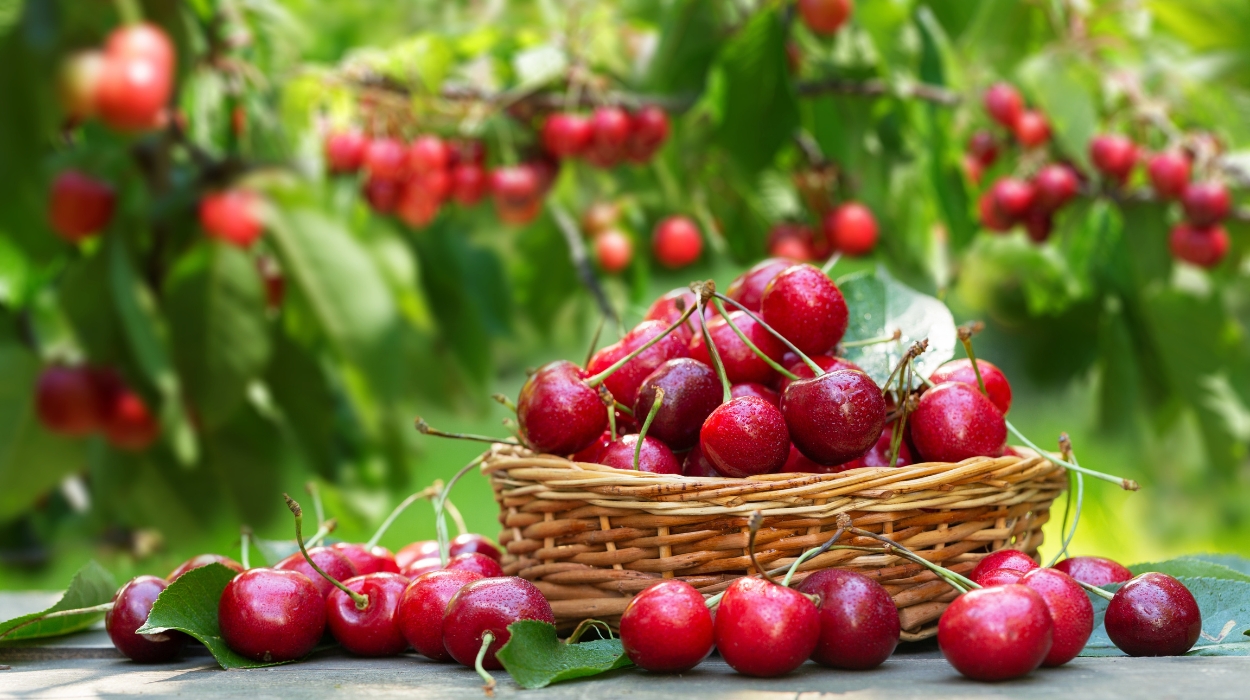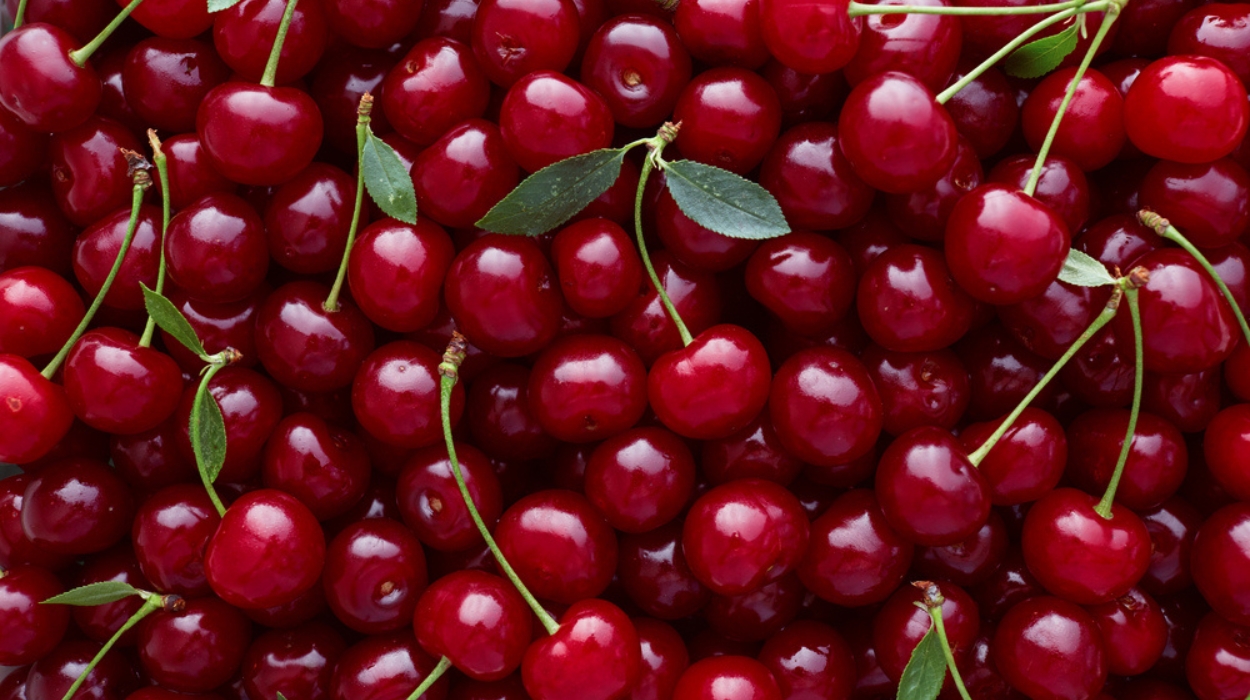Cherries are a small, sweet fruit grown in countries across[1] Europe, North America, and West and East Asia. These juicy fruits are great as a snack or smoothie ingredient and offer a variety of potential health benefits. But are cherries good for weight loss?
Cherries are a low-calorie, high-fiber fruit, and when eaten as part of a balanced diet, they may help you shed excess weight. Read on to learn about how cherries are good for you, how they can help you lose weight, and how to incorporate them into your diet.
Are Cherries Fattening Or Good For Losing Weight?
When eaten as part of a healthy, low-calorie diet, cherries are good for weight loss. They are a rich source of fiber and have a low calorie content, so snacking on cherries can keep you full and help you maintain a calorie deficit.
They also have a wide range of other health benefits due to their powerful antioxidant and anti-inflammatory properties.
Are Cherries Good For Weight Loss?

Some people believe tart cherry juice has fat-burning properties that can accelerate weight loss, but, unfortunately, there’s no evidence to back this claim. Drinking cherry juice has no significant effect[2] on body weight or body mass index. However, cherries have other properties that can promote weight loss.
Cherries are low in calories, making them a nutritious snack for those on a weight-loss diet. One cup of pitted fresh cherries contains just 97 calories[3] and won’t contribute significantly to your daily calorie intake. This can help you maintain a calorie deficit, which is the most important factor[4] for effective weight loss.
Cherries are also a good source of dietary fiber, and eating a high-fiber diet[5] can help you lose weight. Fiber-rich foods may help reduce your overall calorie intake, as they have a lower energy content than low-fiber foods. They can also increase satiety, meaning you feel more full after eating high-fiber foods and are less likely to eat more.
Therefore, eating cherries as part of a balanced, healthy diet can help reduce your overall calorie intake. This can make it easier for you to achieve a calorie deficit which, unless you have a medical condition that inhibits weight loss, will lead to a gradual reduction in body weight.
Benefits Of Cherries For Weight Loss
Cherries are a good fruit to eat if you’re trying to lose weight, primarily because of their low-calorie and high-fiber content. However, they have other properties that can help you lose weight.
For example, cherries have properties that make it easier to exercise regularly, enhancing your weight loss efforts.[6] The cherry fruit contains polyphenols[6] and vitamin C, two anti-inflammatory nutrients that aid muscle recovery after exercise. Cyclists[7] who used a Montmorency tart cherry supplement experienced less exercise-induced muscle soreness than cyclists who didn’t take the supplement.
This means eating tart cherries may help combat muscle fatigue and, as a result, can reduce the recovery time you need between workouts. This can make exercising a more pleasant experience overall and may encourage you to work out more frequently. Regular exercise is strongly associated[8] with effective weight loss and body fat reduction, and including cherries in your diet may help you hit those exercise goals.
Calorie reduction and regular exercise are the cornerstones of healthy weight loss, and consuming cherries may help you do both. Try substituting your regular mid-morning or afternoon snack with a handful of fresh cherries, and read on to learn more about their other health benefits.
Other Impressive Health Benefits Of Cherries

Cherries are a superfood with high nutritional value. Plus, they offer various potential health benefits beyond weight loss.
Oxidative Stress And Anti-Inflammatory Properties
Many of these health benefits are due to the anti-inflammatory and antioxidant properties[9] of the polyphenols and vitamin C found in cherries. Oxidative stress and inflammation are directly linked to many serious diseases,[10] including diabetes, high blood pressure, heart disease, kidney disease, neurodegenerative diseases, and cancer. Eating anti-inflammatory and antioxidant-rich foods may help to mitigate this damage and reduce your risk[11] of chronic disease.
High Blood Pressure
Regular cherry consumption may also help regulate blood pressure due to its rich polyphenol content.[12] People who drank dark sweet cherry juice for 30 days had lower blood pressure[13] than the control group. Since high blood pressure is a key risk factor for cardiovascular disease, including cherries in your diet could help promote heart health.
Skin Health
Cherries aren’t just good for your insides — they can improve your skin health, too. Chronic inflammation contributes heavily to skin aging[14] and the formation of wrinkles, but eating certain foods could help combat this effect.
Polyphenols in cherries could help reduce inflammation and oxidative damage in the skin. This may inhibit collagen degradation[15] and increase collagen synthesis, helping to keep fine lines and wrinkles at bay. Therefore, regularly eating cherries could help keep your skin looking firm, fresh, and youthful.
Better Sleep
Finally, eating cherries could help you sleep better. Montmorency cherries, or sour cherries, are a natural source of melatonin[16] and could regulate your sleep-wake cycle.
Tart cherries have been found to improve sleep quality by increasing total sleep time[17] and sleep efficiency. When consumed regularly, cherries can effectively promote peaceful sleep and could function as a natural remedy for insomnia.
How To Enjoy Cherries In Your Diet
Most people like to eat cherries fresh, especially during the cherry season when the fruit is most widely available. Sweet cherries, like Bing cherries, can be consumed fresh and raw — just remember to eat around the pit. Sweet and tart cherries can also be used to add color to salads, blended into smoothies, or eaten atop Greek yogurt.
Sour or tart cherries can also be eaten raw but are more often found dried, juiced, frozen, or canned. Dried cherries and frozen cherries are commonly used to add natural sweetness to baking. You can add cherries to a variety of cakes and pies.
Canned cherries are also widely available but often contain lots of added sugar and, therefore, may not be a good choice for dieters. If you want to harness the weight loss benefits of cherries, it’s best to stick to the raw, fresh fruit.
Cherry Juice
You can also enjoy the health benefits of cherries by drinking their juice. However, it’s important to be mindful of portion sizes, as cherry juice is high in natural sugars.[18] The recommended daily portion[19] of pure fruit juice is 150 ml or one small glass.
Remember, you don’t necessarily need to drink fresh cherry juice, as tart cherry juice concentrate has the same nutritional value and may be more economical for everyday consumption.
Cherry Extract Supplements
If you want the health benefits of cherries, you can also look for fruit and vegetable supplements containing cherry extract. Green powders also contain many of the same essential vitamins and minerals that make cherries so healthy and can significantly improve the nutritional content of your diet.
Conclusion
Cherries are a delicious fruit with a low-calorie and high-fiber nutrition profile, making them one of the best fruits for weight loss. A handful of fresh cherries can quickly satisfy a sugar craving without pushing you out of a calorie deficit, and their fiber content makes them a highly satisfying snack.
Besides being good for weight loss, cherries have an impressive range of other health benefits. They contain powerful antioxidants and anti-inflammatory nutrients which can help mitigate damage caused by free radicals. Regularly consuming cherries can reduce your risk of various medical conditions, including[20] heart disease, high blood pressure, diabetes, arthritis, and cancer.
If cherries are out of season, don’t worry; cherry juice has all the same health benefits as fresh fruit. Many grocery stores also stock dried, canned, and frozen cherries, so you can enjoy their health benefits year-round.
If you have questions about cherries and their potential role in weight loss efforts, consider meeting with a registered dietitian. A registered dietitian can help you determine your calorie goals and decide how to work cherries into your well-balanced diet.
Frequently Asked Questions
Cherries are a low-calorie, high-fiber fruit, which makes them a good choice for people trying to lose weight. One cup of cherries contains just 97 calories,[3] so this snack won’t significantly contribute to your daily energy intake.
Cherries contain a little over 0.5 mg[18] of iron per cup. If you want to include more plant-based sources of iron in your diet, dried apricots contain more iron with around 3.5 mg[21] per half-cup.
Eating too many fruits of any kind can cause gastrointestinal issues, as fiber is a natural laxative. Consuming 14 cherries[22] should be enough for you to enjoy the health benefits without stomach pain.
Some people believe that dark cherries are the healthiest, but no firm evidence supports this. Sweet and tart cherries have potent antioxidant properties, regardless of their color.
Cherries are low in calories, so they are not fattening when eaten in moderation. However, like all foods, they may cause weight gain if eaten in excess.
 Evidence Based
Evidence Based
